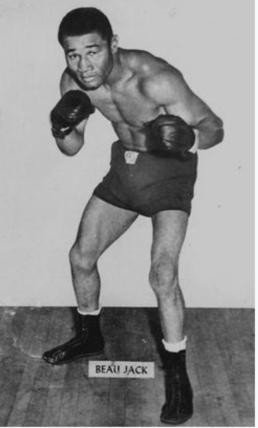These life stories may contain descriptions of childhood trauma and abuse, as well as images, voices and names of people now deceased. If you need help, you can find contact details for some relevant support services on our support page.
African American boxing champion, Beau Jack (1921-2000), was raised in kinship care.
Beau Jack was born Sidney Walker on a farm in Georgia. He was raised by his grandmother, Evie Mixom, who gave him the name ‘Beau Jack’. When he was a child, she “told people that Beau would be a fighter or a preacher”.
When Beau Jack was about eight years old, he would get up early each morning so he could walk from the farm into the city of Augusta to secure the best spot for shining shoes.
The money he earned made him a target, and one day he came home in tears. Five boys had threatened him into surrendering the three dollars he had earned, he sobbed to his grandmother. Evie took off all his clothes and beat him. “You better fight till the blood runs out your shoes,” she said. No Walker is supposed to be runnin’ nowhere” (Smith).
When a week later, a gang of boys demanded one of his tips, Beau Jack fought them off. Soon, Beau Jack was joining in on ‘battle royals’.
During the 1930’s, wealthy white men in the South amused themselves by placing a group of perhaps 6 to 10 young men, usually blacks, blindfolded inside a ring for a battle royal. The youngsters would slug away until only one was standing, and then the coins would shower down (Goldstein).
After the death of his grandmother, Beau Jack was on his own from a young age. He got married and started a family at the age of fifteen. He is said to have had fifteen children.
As a teenager, Beau Jack worked as a caddie for golf legend, Bobby Jones, at the Augusta National Golf Club. Jones financed Beau Jack’s early boxing career and later helped him relocate to Massachusetts to receive formal boxing training.
Beau Jack’s professional career began in 1940 when he won all but two of his first twenty-eight fights. The following year, he moved to New York City under the management of Chick Wergeles.
He was a main-event attraction at the Garden 21 times, more than any other fighter, he won and lost the lightweight (135-pound) title twice, and he drew what is evidently the biggest gate in boxing history – almost $35.9 million in War Bond purchases – fighting at the Garden as an Army Private in 1944 (Goldstein).
Beau Jack retired from boxing in 1955 and returned to Georgia to take up farming. He later ran a shoe-shining stand at the Fontainebleau and Doral hotels in Miami Beach, where he also worked as a dishwasher. In his later years, Beau Jack trained young fighters at the old Fifth Street gymnasium in Miami Beach. He was proud of his achievements and satisfied with his post-boxing career life.
I’ve been to the top of the mountain. I was champion of the world. I’ve worked hard all my life, and I’m happy doing what I’m doing. It’s an honest job and a good living — and I meet a lot of nice people (Goldstein).
Beau Jack campaigned for a pension plan for boxers so that future fighters would not struggle with finances in old age as he did. He was inducted into the World Boxing Hall of Fame in 1986 and the International Boxing Hall of Fame in 1991.
Beau Jack died in a nursing home at the age of seventy-eight due to complications of Parkinson’s disease. He is survived by five children, including two sons, Michael Walker and Gregory Walker, and three daughters, Chonita Walker, Chauneille Sykes, and Georgiana McCartney.
References:
“Beau Jack.” International Boxing Hall of Fame. http://www.ibhof.com/pages/about/inductees/modern/jack.html
Goldstein, Richard. (2000). “Beau Jack, 78, lightweight boxing champion in the 1940’s.” The New York Times, 12 February 2000. https://www.nytimes.com/2000/02/12/sports/beau-jack-78-lightweight-boxing-champion-in-the-1940-s.html#:~:text=Beau%20Jack%2C%20a%20one%2Dtime,He%20was%2078.
Lewis, Mike. “World champion boxer who ended his days as a hotel shoeshine boy.” The Guardian, 29 February, 2000. https://www.theguardian.com/news/2000/feb/28/guardianobituaries
Smith, Gary. (1988). “Still Fighting Old Wars. Former Lightweight champ Beau Jack lives out his Legend.” Sports Illustrated, 68(7). https://vault.si.com/vault/1988/02/15/still-fighting-old-wars-former-lightweight-champ-beau-jack-lives-out-his-legend
Image available here.
